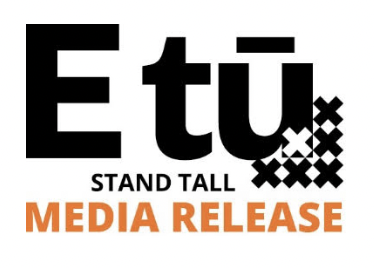E tū says the Minimum Wage rise to $21.20 from 1 April is excellent news – an increase that’s much needed to make sure the wages of low-paid workers keep pace with inflation.
The 6 percent increase corresponds with the change to the Consumer Price Index (CPI) of 5.9 percent from the year ended December 2021.
E tū Assistant National Secretary Annie Newman says the increase will benefit Aotearoa’s lowest-paid workers, including many essential workers who continue to provide vital services during the ongoing Covid crisis.
“The Minimum Wage has gone up in correspondence with inflation, which is great to see,” she says.
“It also recognises that we need to pay workers properly for the work they do. Essential work shouldn’t be, and doesn’t need to be, poorly paid.”
However, Annie says E tū will continue to push to see the Minimum Wage rate brought into line with the Living Wage rate of $22.75.
“We believe that this should be the minimum wage floor for all workers.”
The union is also actively campaigning for Fair Pay Agreements, which will establish standards across whole industry groupings, as well as the Government’s proposed social unemployment insurance scheme, to become law.
“The rise of the Minimum Wage is a great start. However, we know that to create truly decent working environments for all New Zealanders, we still need to go further.
“Implementing Fair Pay Agreements, along with a social unemployment insurance scheme, will lift working conditions to a standard not seen for decades in Aotearoa,” Annie says.
“To us, Decent Work means a decent income, a quality work environment, secure work, and room for workers’ voices at the table – all these initiatives will be invaluable in helping us to achieve better working lives for everyone in our communities.”






Always good to see Minimum Wage lifted. B-u-t…Fair Pay Agreements and needed wage floor need not be linked in any way to the dodgy insurance scheme, which really just further extends the inequity of WFF and the second tier COVID benefits.
Working class and underclass beneficiaries and their kids are excluded from WFF and COVID benefits. Labour like National demonises beneficiaries and has put them into debt for motels when they should be doing a state house mega build.
Why bother increasing minimum wages, when you don’t need to pay people minimum wages in NZ anymore (or even taxes in the growing cash economy) and more and more people are coming into NZ to run scam businesses.
When caught wage criminals get pitiful fines, which clearly shows NZ government and laws are allowing this alarming situation to become mainstream, from Chorus to the police to construction to government agencies they all seem to be underpaying staff or not paying taxes appropriately.
Construction company fined only $2500 for using illegal migrant labour
Immigration NZ’s scores first win in recent flurry of prosecutions.
Auckland construction company Dison Homes has been sentenced to pay $2500 after pleading guilty to two illegal migrant labour charges, with similar charges withdrawn against its sole director Dacheng Zhao.
https://www.nbr.co.nz/story/auckland-construction-company-fined-2000-using-illegal-migrant-labour
MBIE prosecution: Hamilton man, company to fight charges of underpaying workers
https://www.nzherald.co.nz/nz/mbie-prosecution-hamilton-man-company-to-fight-charges-of-underpaying-workers/5JN7W3OONQXAAZZ5EB5E73SRWM/
22 restaurants, 120 staff – and now a $40,000 fine
https://www.nzherald.co.nz/business/news/article.cfm?c_id=3&objectid=12014023
Bakery owner to pay back $33,800 illegally deducted from worker’s wages
https://www.stuff.co.nz/business/112128450/bakery-owner-to-pay-back-33800-illegally-deducted-from-workers-wages
Burger King banned from hiring migrant workers, placed on Employment NZ’s stand-down list for year
https://www.nzherald.co.nz/business/news/article.cfm?c_id=3&objectid=12115610
Chorus, https://www.nzherald.co.nz/business/news/article.cfm?c_id=3&objectid=12138990 the police, https://www.stuff.co.nz/business/119873753/nz-police-fined-7000-and-banned-from-hiring-migrant-workers-for-six-months even Oranga Tamariki in news today as one of their ‘subcontracted’ youth businesses employed a gang member dealing drugs bring his charges with him on drugs deals.
Subcontracting out work seems to be part of the problem, allowing these illegal business scams and wage criminals to prosper in NZ.
Instead of enabling and pretending this doesn’t exist by unions, they would get more respect if they actually bothered to do their jobs and stop criminal labour activity.
Well part of this old chap is low union density, since the Natzos union busting 1991 Employment Contracts Act.
Less members equals less capacity to chase every dirty opportunist employer. As an old ’51 Waterfront Lockout veteran used to say “all bosses are bastards until they prove otherwise, and very few have proved otherwise”.
The NZCTU is not exactly a class left campaigning organisation either which deprives workers of some hard hitting leadership like we used to have with Jim Knox from the old FOL. Decades ago and institutional memory of workers power has faded.
Individual precarious workers are not going to fix your list of woe are they? No they are not. It takes unity, class understanding and collective action to sort these bastards out. Rebuild a fighting left in NZ.
Does that mean the living wage will go up too?
I felt that, because of the higher inflation rates we’ve experienced recently, it would be good to keep the minimum wage at its current rate, especially seeing that it was increased from $18.90 not so long ago.
Employers will need to increase the cost of goods in order to fund the wage increase, which is not so good when we are an exporting nation and we’re in the year of reopening our borders to the world.
Personally I felt that it would be ideal for New Zealand to implement a lower minimum wage rate for the first year of being back in international business, of perhaps $19.00 an hour. Then in 2023, the minimum wage rate could be increased to $20.50 an hour, and in 2024 it could be increased to $22.00 an hour.